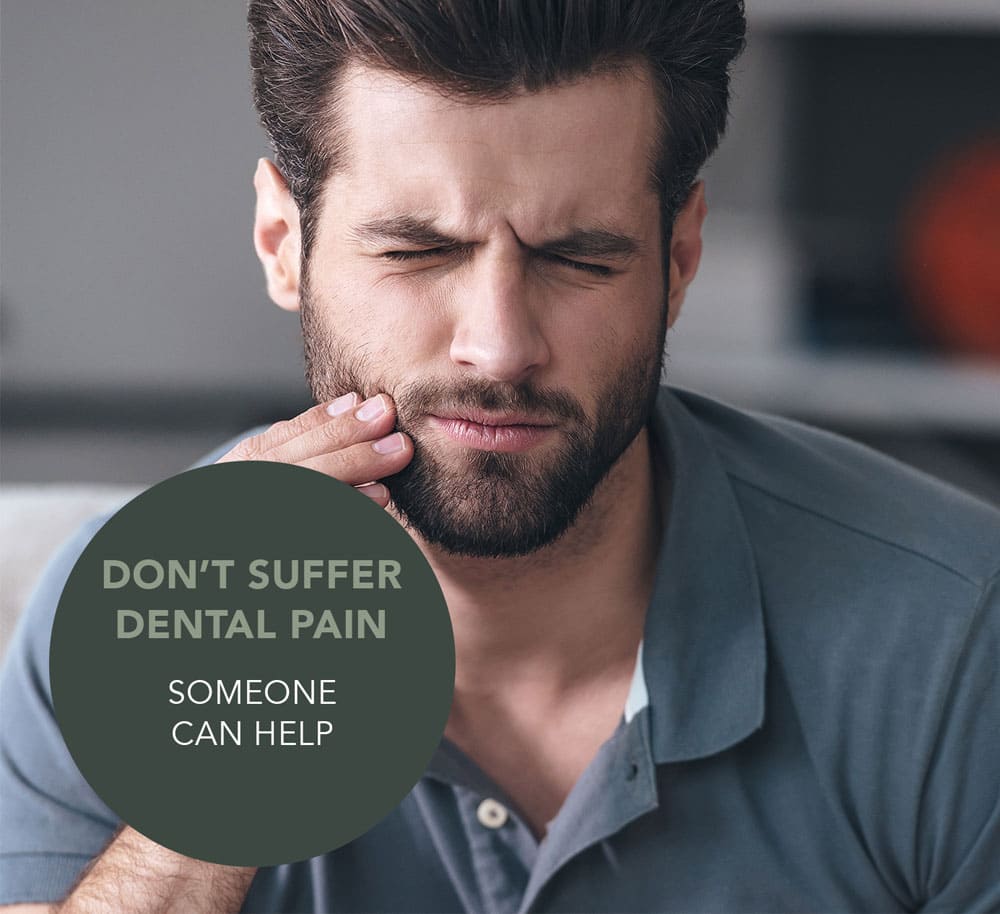TOOTHACHE
Toothache can be eased with over-the-counter painkillers – speak to your pharmacist, they will be able to advise you on the best medication to help alleviate your pain.
You can also try and floss around the area, in case there is lodged food that is causing the pain. If you have facial swelling, apply a cold compress to the outside of your mouth/cheek. Contact the practice for an emergency appointment as soon as possible.
KNOCKED OUT TOOTH
If your tooth is knocked out, call the practice immediately and book an emergency appointment. The sooner you see your dentist, the better chance your tooth will have of survival, ideally within one hour of the trauma taking place. Try to handle the knocked out tooth by the crown, not the root as touching the root can cause damage to the cells that are needed to re-attach the tooth to the bone.
Gently rinse the tooth in cold running water to remove any debris, but do not scrub it. It is very important that the tooth doesn’t dry out. If you feel able, reposition the tooth back into its socket. If not , place the clean tooth in your mouth between the cheek and the gum to keep it moist (not recommended for children as they may swallow the tooth). Alternatively, put the tooth in a clean container and cover it with milk.
If a baby tooth is knocked out, do not try and insert it in the mouth. The patient should be seen as soon as possible at the practice to make sure that none of the tooth remains in the mouth.
LOST/BROKEN INVISALIGN BRACE OR BROKEN ORTHODONTIC WIRES
If you break/lose your Invisalign aligner, contact the practice as soon as possible to have a new one ordered – you will not need to attend the practice for this, so even if you are not in the country, we can order them on the day you call us. In the meantime, wear your previous stage aligners to ensure that you don’t have a relapse with your straightening.
If an orthodontic wire breaks or sticks out and is poking in your cheek, gum or tongue, try using the rubber end of a pencil to push the wire into a more comfortable position. If you can’t reposition the wire, cover the end with orthodontic wax.
Never cut the wire, as you could end up swallowing it or breathing it into your lungs.
ABSCESSES
Abscesses are infections that occur around the root of a tooth or in the space between the teeth and gums. Abscesses are a serious condition that can cause damage to the tissue and surrounding teeth.
Antibiotics can be prescribed by your dentist and painkillers can be taken to manage the pain until you can attend the practice. You can also try rinsing your mouth with a mild salt water solution (1/2 teaspoon of table salt in 8 ounces of water).
If you have a severe facial swelling or have difficulty swallowing/breathing then you should go straight to hospital.
SOFT TISSUE INJURY
Injuries to the soft tissues, which include the tongue, gums, lips and cheeks, can cause bleeding. To control the bleeding rinse your mouth with a mild salt water solution and use a piece of moistened gauze to apply pressure to the area for 15 minutes.
If the bleeding doesn’t stop, make an appointment immediately to attend the practice, or a hospital if you are not in the local area.
LOST CROWN/BRIDGE
If your crown or bridge comes out do not use any kind of glue to try and put it back in place! Contact the practice as soon as possible and make sure you bring your crown/bridge in with you on the day of your appointment.
If you are unable to attend the practice on the same day, you can purchase temporary cement from the pharmacist. Make sure you follow the instructions carefully on the packet and be aware this is a short-term fix that may only keep the restoration in place for a day or two.
BROKEN TEETH/FILLINGS
If you fracture a tooth, rinse your mouth with warm water to remove any fragments left in your mouth. Sometimes, the broken tooth/filling can leave a rough edge in the mouth – you can purchase a temporary filling material from your pharmacist that can be used to cover the broken section until you can attend the practice to have the tooth repaired. Minor fractures and chips can be smoothed over by your dentist, whilst larger ones may need a restoration to repair the tooth.


